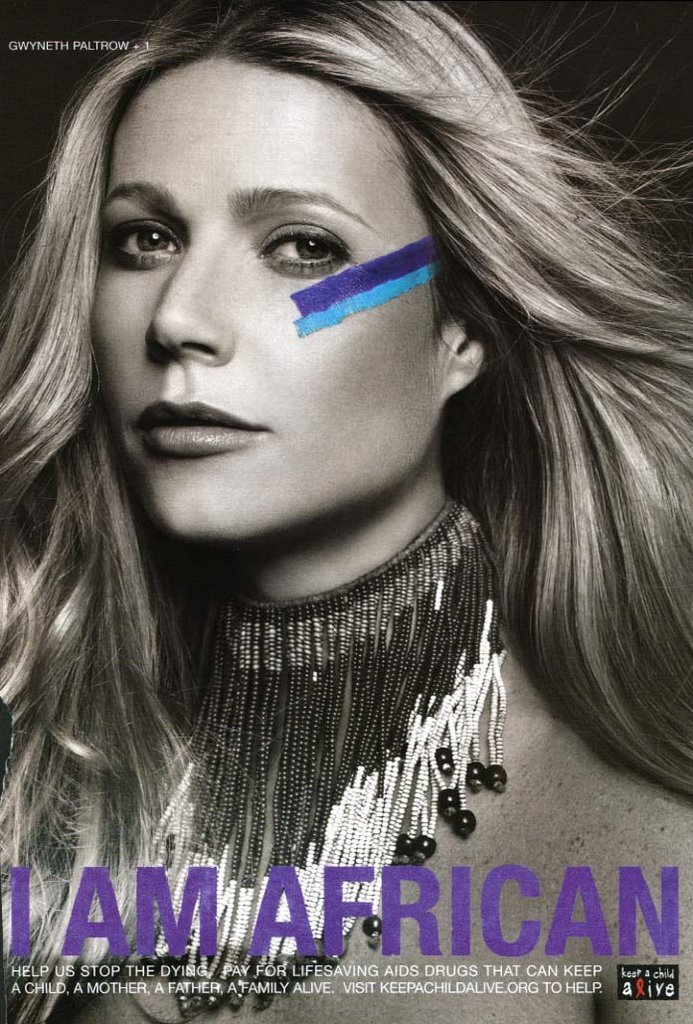ARGUMENT AGAINST
This article responds to the argument proposed on i-Muse Debates last week on the role that celebrities play in setting the agenda for international cooperation in economic assistance to developing countries. I believe that the judgments passed on celebrities for their advocacy on behalf of African economic development are ridiculous. Although the performance of this self-selected cast of performers remains highly contentious, it must be accepted that this activity is a crucial signal that the traditional script of international relations is changing. This article testifies in favor of the authentic importance of 'celebrity agency', recognizing it as a step in the right direction.
Attempts to trivialize celebrity engagement, reducing it to feel-good activity, or worse still a mere ‘fad’ may paradoxically feed an image that in itself trivializes the serious issues they are voicing. The “I Am African” was established to unite Hollywood celebrities in order to raise money for African children affected by AIDS. These celebrities were featured in magazines such as LIFE and GQ, forums which would typically be closed to the cause. Furthermore, in naming Bono Person of the Year, Times labeled him a good Samaritan. But this powerful biblical image misses the point of Bono’s significance as a celebrity leader. He goes beyond being a high-profile good Samaritan - he stretches the moral imagination of his musical audience so that they, too, see the need to reach out to their global neighbors. "We're talking about building constituencies of interest,” these A-listers are reaching a much wider crowd, drawing more press attention to pressing issues than non-celebrity aid workers ever could.
Attempts to caricature this type of agency, without highlighting their distinctive contributions is dangerous. In the Democratic Republic of Congo, Jessica Lange and Angelina Jolie visited burgeoning camps of people displaced by a decade of civil war, where perhaps 4 million were killed. Bono set up a Washington-based pressure group called DATA, which lobbied in the halls of Congress and in European capitals for debt relief among Africa's poorest nations. In South Africa, in the township of Soweto near Johannesburg, American talk show host Oprah Winfrey built her own school, hired her own teachers, and interviewed the hundreds of girls who would attend. "This is not to sideline the governments and the people on the ground doing real work, but when a celebrity comes to catapult an issue into people's consciousness, that has to be applauded."
Finally I fault the House's motion not only for misrepresenting the nature of celebrity activism but also for distorting the weight of celebrities as agenda setters. While individual agency outside the usual orthodox sources matters, the hold of political forces as determinants of policy outcomes cannot be neglected. Agreed, it is a sign of the times that an Irish pop singer becomes one of the most visible persons attacking global poverty. Where are the African political and religious leaders? Why have they not already headed a more successful effort of their own? … In the absence of any satisfactory answers I will shift my attention to the unavoidable fact that society in this day and age is shaped more by entertainment than by politics and is more enamored with celebrities than moved by leaders. Popular culture like it or not has a crucial role to play in creating awareness of world issues, in persuading World political leaders to take action on these issues.
To conclude I propose to you that ‘Celebrity Activism’ in itself is not a problem. The issues arise when African leaders and policy makers abdicate their responsibilities to these stars. Africans should stop seeing themselves as ‘victims of ‘Western celebrity activism.’ These celebrities are merely setting the stage and grabbing the attention of a global audience for the true architects of development with whom the responsibility is bestowed upon to step in. Rather than feeling afflicted, Africans should embrace the newly found media attention on a Continent which has been so readily been for far too long relegated to the ranks of the Forgotten. Africans need to take full advantage of the momentum created by the ‘Development Buzz’ to set their own agenda.
ARGUMENTS FOR
Celebrity activism in Africa seems to be in fashion at the moment: A pseudo-famous person attempts to rejuvenate their profiles by affiliating with an NGO or charity and suddenly becomes an expert on African development. Should we not as Africans be ashamed of this trend of non-elected individuals berating our democratically elected governments? Further, what relevant expertise/qualifications do these celebrities have that indicate their competence at formulating economic policies? Are we not capable of designing, implementing and evaluating policies - to address poverty alleviation, without expert singers setting the trajectory of our development? These are questions we as Africans ought to take more seriously.
During the noughties, Africa fell victim to the rising exports of Western celebrity activism. 2005 especially was a banner year and put African development on the international agenda. The term “Development buzz” was coined by Paul Collier to encapsulate this movement. Celebrity rock-stars such as Bono, backed by the American economist, Jeffrey Sachs (whose austerity measures helped wreck Bolivia, Poland, and Russias' economies) pushed for the cancellation of debts and advocated increasing Western aid and aid-related assistance. Ironically, it could be argued that rising aid has had an adverse impact on Africa’s development over the past few decades: Dambisa Moyo argues in “Dead Aid” that Western aid has crippled Africa’s development rather than stimulate it. Further it has increased the level of dependency on the West as our economic saviour, severing the link between the state and civilians: a crucial link in fostering accountability.
In addition to the negative impact on our economies, I worry about the adverse impact this celebrity trend has on Africa’s "brand". It is reminiscent of the “White Man’s burden”, and only serves to emphasise the notion that Africans are helpless, reinforcing the only story repeated about us time after time (“Chimamanda Ngozi Adichie, A single story”). The blame can only be laid on us as we allow celebrities to search for personal meaning and purpose in the deserts and grasslands of our continent, instead of starting a meaningful debate about how to take Africa forward. What message are we giving out to young Africans?
A third concern of mine is that celebrities’ interest in Africa seems to be a fashionable pastime. Historically, Africa as a continent has been abysmal at saving for a rainy day. As we are emerging from the worst recession since the Great Depression, Western fiscal budgets are being squeezed inevitably; and International aid is sliding down the political agenda as domestic issues take priority. Africa may soon become out of fashion. Further, celebrities oversimplify remedies to seduce and "entertain" the average Western consumer. However the reality is far more complex than portrayed, and requires heterogeneous solutions to each country or region.
I shall conclude with an excerpt from Paul Collier’s book, "The Bottom Billion": “Development buzz has to keep its messages simple, driven by the need for slogans, images and anger. Unfortunately, although the plight of the bottom billion lends itself to simple moralizing, the answers do not. It is a problem that needs to be hit with several policies at the same time, some of them counterintuitive. Don’t look to development buzz to formulate such an agenda: It is at times a headless heart.”
Please send your comments on the proposition, these can be aired on our Facebook, Twitter or EBlogger domains. The best comments will be featured throughout the week and voting outcomes communicated.




No comments:
Post a Comment